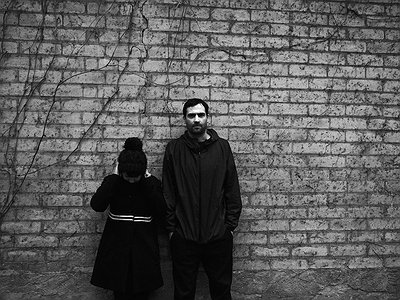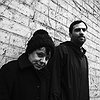Take us through a day in your life, from a possible morning routine through to your work, please. Do you have a fixed schedule? How do music and other aspects of your life feed back into each other - do you separate them or instead try to make them blend seamlessly?
Sara: I start my day with one to two hours of walking with my dog. I live in the mountains and go on long hikes regularly. Then I start playing my instrument, working and composing. I also take care of all the administration of my concerts (during the Corona lockdown, I organised more than 170 mini concerts by Skype or at people's houses, it takes all my time to organise). I always have my phone with me, and I record ideas through the dictaphone app.
Manuel: Most of the time I have a completely crazy sleeping pattern, so there is no fixed routine at all. I have the freedom to just concentrate on music, so there is not much really around this. Normally I get up, drink a coffee, read and reply to all the mails and things I have to do administratively and then I just focus on music, until I am completely dead. Then I sleep and start over again.
Can you talk about a breakthrough work, event or performance in your career? Why does it feel special to you? When, why and how did you start working on it, what were some of the motivations and ideas behind it?
Manuel: In my opinion there is no real breakthrough work, as one leads to another and it is a continuous flow. But to make an example: In 2016 I created a Liveshow called ‘Erratic’ with three friends. It resulted in my installation outlet Encor Studio. Since then, we continuously collaborate on many audio, visual, digital and physical installations.
Sara: A performance that lasted 8 hours. It started at midnight, and ended at 8am. I was with a jazz pianist (Colin Vallon), and a drummer (Julian Sartorius). We had the sleep cycles as a framework. The audience was in bed, each person in a bed, in pajamas. We had a framework: pure improvisation during the deep sleep phase with a piece that we transformed little by little and during paradoxical sleep phase free improvisation in connection with the piece. We had several cycles, and each one of us played a solo of about 10-30 minutes.
It was an extraordinary experience, because very special things happened, as much for us, as for the public. People were very moved by this experience. I greatly enjoy new experiences, especially those that go beyond the traditional concert setting.
There are many descriptions of the ideal state of mind for being creative. What is it like for you? What supports this ideal state of mind and what are distractions? Are there strategies to enter into this state more easily?
Sara: I find that fatigue and exhaustion at the end of a tour are not conducive to creativity. I need silence, my wooden cottage, the nature around, the calm — all of this creates the attention in me that is necessary to write.
The influences are multiple. When I can't compose, when the ideas are not there for example, a very dear friend of mine used to tell me that I soak up everything around me, to come back to my compositions better afterwards.
Manuel: For me it’s really about taking time to do it. But generally, I am not a good worker in the morning. I enter a somehow floating state at some point later in the day, and then I can be very fast in transforming ideas into sounds. My general approach is to start with experimenting with something really basic and transform this into something. After that, it just happens.
Music and sounds can heal, but they can also hurt. Do you personally have experiences with either or both of these? Where do you personally see the biggest need and potential for music as a tool for healing?
Sara: I suffered a lot from my classical music studies. I had the impression that the institution was trying to kill the pleasure of playing, that the simple joy of finding one's instrument was diminishing. Music had become almost solely a subject where you have to excel. Then, I found the pleasure again, thanks to encounters.
I think that music can heal, but nothing is permanent. One day a violent music, one day a barely perceptible sound. I think that certain composers have a profound effect on our body and soul. I think of Bach for example. But we must not forget silence too.
Manuel: I am not really sure about music for healing, as in my experience I tend to listen to music that intensify the feelings I have. So I get a feeling of healing when I free myself from that notion and listen to nothing. The only sounds that I can see as healing are the sounds of nature, that have no apparent emotion except what we associate with it. For me, these sounds are somehow calming. But maybe that is because I don’t really experience sonic violence in nature where I live, except occasional avalanches and rocks crushing down a mountain, which are wonderful sounds (from the distance).
There is a fine line between cultural exchange and appropriation. What are your thoughts on the limits of copying, using cultural signs and symbols and the cultural/social/gender specificity of art?
Manuel: It is very complicated for me to understand those limits in music, as music has this universal feel. I can listen to some Brazilian psychedelic music from the 60s and feel a connection to it, like it was always part of me. So does this influence me? Obviously it somehow does on an emotional level. It's a very complicated question that might never be answered fully, but, musically we all profit since the world has grown closer together.
Sara: Excellent question. The border is inherently porous. We are social beings, who inspire each other. There are obviously a thousand influences in me. I think that kindness and honesty are things that must or should guide our path.
Our sense of hearing shares intriguing connections to other senses. From your experience, what are some of the most inspiring overlaps between different senses - and what do they tell us about the way our senses work?
Sara: I saw a film in which the filmmaker is in the process of losing his sight. His brain recreates hallucinating connections where everything is created again, with new colors. For me, when I hear music, I have colors that come to me. I think that everything is connected. Our senses are also connected, directly. When I hear my coffee pot boiling, I look forward to what is to come.
Manuel: When I play live shows, I get into this strange mental state, where I somehow see what needs to be heard next. So the visual aesthetics of music even though they are just imagined are in my opinion completely interwoven with hearing it. I can somehow look at something and imagine its sound. So it works both ways.
Art can be a purpose in its own right, but it can also directly feed back into everyday life, take on a social and political role and lead to more engagement. Can you describe your approach to art and being an artist?
Manuel: I think that everything is somehow political, the way I live, where I live, where I play or not with every object I buy. But I don’t want to be a political messenger. Music is more universal than our pitiful little memory games and illusions of control and organisation. I don’t want to be a vehicle for any agenda. I wan’t my music to be emotionally connecting beyond my place in this society. That’s why I generally prefer non vocal music. With that being said I can lend my voice and be active for all kind of causes.
Sara: Absolutely! There are all kinds of artists who are more or less politically engaged. For me, I don't have a direct political message. I try to touch people at another place, maybe more intimate, more inside of them, without a specific goal. I think that my music makes people look inside themselves, and I feel this also applies to the music the two of us make together.
What can music express about life and death which words alone may not?
Sara: Music without words allows one to go towards being more objectivity, because we are less guided. Besides, music is the most objective artistic discipline. It leaves an infinite panel of interpretation, where the listener is completely free. And perhaps that allows us to go into deep states, death, life, that words could not describe, because they lock up.
Manuel: For me, music is the language of the universe. Everything is a vibration, and music is the art of manipulating this vibrating language and to join into the endless echo of this vast space. So music is more universal than any concept of life and death.



